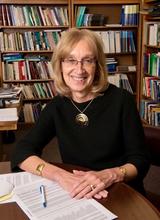In This Story
Originally published on March 10, 2021
“We still have not passed effective policy addressing the spread of disinformation or the ethics of gathering online information on people,” said Priscilla Regan. “If we could address information privacy, I believe we could mitigate disinformation and greater ethics issues.”
For the past 40 years, Schar School professor Regan has studied the dynamic world of technological change and the policies that accompany it. She’s lived it first-hand: “I wrote my dissertation on long-hand and lived in the library, because that is where all of the information was,” she said. “We went from writing on these chunky computers to having an incredible amount of knowledge at our fingertips within a very short time. Because of easy access to information and composing ideas, everything is vastly different.”
Regan joins a distinguished panel of technology security experts at noon (EST) on Thursday, March 18, during a discussion called “Health Trackers & Tracers: Big Data and the Challenge of User Privacy in the Age of Covid-19.” The virtual event is hosted by George Mason University’s Office of Government and Community Relations.
Other panelists include Washington Post technology columnist Geoffrey Fowler, Paul Jarris of the MITRE Corporation, Virginia Department of Health executive advisor Jeff Stover, and Mason assistant professor of computer science Foteini Baldimtsi. The session will be moderated by Nektaria Tryfona, scientific director for data innovation and strategy at Mason.
The discussion is part of Mason’s Arlington Forward Series, which centers on Mason’s transformational expansion of its Arlington Campus, the development of the Institute for Digital Innovation, and the creation of the Rosslyn-Ballston Innovation Corridor.
The challenges of user privacy are not new to Regan. Before becoming a professor at the Schar School, Regan provided insights to Congress as a senior analyst in the Congressional Office of Technology Assessment (OTA) between 1984 to 1989. However, her true passion was teaching and research.
“In 1989, [George Mason University] was a much smaller place,” said Regan. “Yet, there was this undeniable need within the state for a major university in the Northern Virginia area…When I came in, there was an uptick in faculty who were interested in research. There was quickly an increase in the overall profile of the university and the quality of graduate programs.”
Regan has seen issues within the realm of technology change dramatically over the past 40 years. Her work will continue to evolve as technology—and the world—continue to advance.

